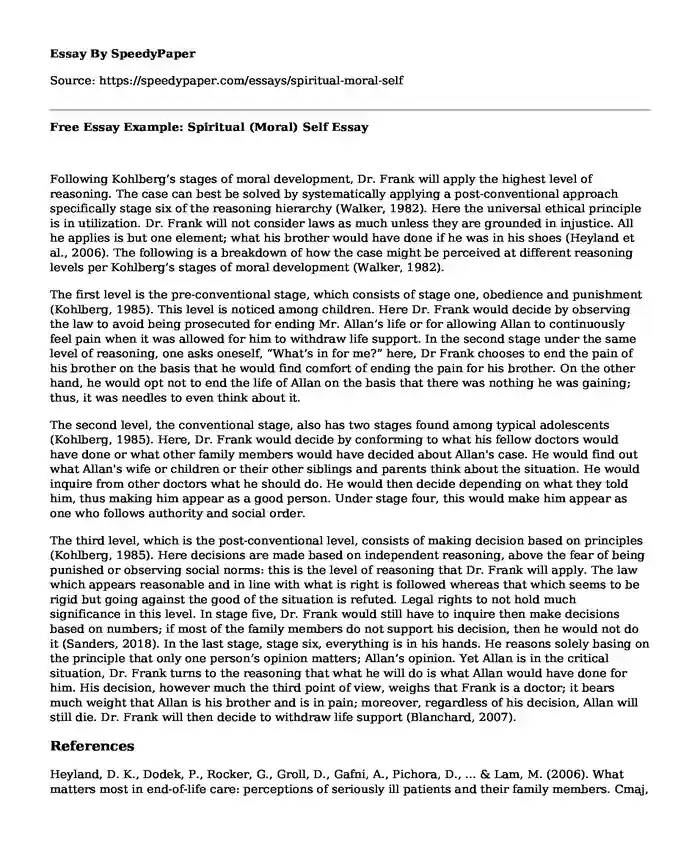
| Essay type: | Persuasive essays |
| Categories: | Psychology Euthanasia Behavior Ethical dilemma |
| Pages: | 3 |
| Wordcount: | 770 words |
Following Kohlberg’s stages of moral development, Dr. Frank will apply the highest level of reasoning. The case can best be solved by systematically applying a post-conventional approach specifically stage six of the reasoning hierarchy (Walker, 1982). Here the universal ethical principle is in utilization. Dr. Frank will not consider laws as much unless they are grounded in injustice. All he applies is but one element; what his brother would have done if he was in his shoes (Heyland et al., 2006). The following is a breakdown of how the case might be perceived at different reasoning levels per Kohlberg’s stages of moral development (Walker, 1982).
The first level is the pre-conventional stage, which consists of stage one, obedience and punishment (Kohlberg, 1985). This level is noticed among children. Here Dr. Frank would decide by observing the law to avoid being prosecuted for ending Mr. Allan’s life or for allowing Allan to continuously feel pain when it was allowed for him to withdraw life support. In the second stage under the same level of reasoning, one asks oneself, “What’s in for me?” here, Dr Frank chooses to end the pain of his brother on the basis that he would find comfort of ending the pain for his brother. On the other hand, he would opt not to end the life of Allan on the basis that there was nothing he was gaining; thus, it was needles to even think about it.
The second level, the conventional stage, also has two stages found among typical adolescents (Kohlberg, 1985). Here, Dr. Frank would decide by conforming to what his fellow doctors would have done or what other family members would have decided about Allan's case. He would find out what Allan's wife or children or their other siblings and parents think about the situation. He would inquire from other doctors what he should do. He would then decide depending on what they told him, thus making him appear as a good person. Under stage four, this would make him appear as one who follows authority and social order.
The third level, which is the post-conventional level, consists of making decision based on principles (Kohlberg, 1985). Here decisions are made based on independent reasoning, above the fear of being punished or observing social norms: this is the level of reasoning that Dr. Frank will apply. The law which appears reasonable and in line with what is right is followed whereas that which seems to be rigid but going against the good of the situation is refuted. Legal rights to not hold much significance in this level. In stage five, Dr. Frank would still have to inquire then make decisions based on numbers; if most of the family members do not support his decision, then he would not do it (Sanders, 2018). In the last stage, stage six, everything is in his hands. He reasons solely basing on the principle that only one person’s opinion matters; Allan’s opinion. Yet Allan is in the critical situation, Dr. Frank turns to the reasoning that what he will do is what Allan would have done for him. His decision, however much the third point of view, weighs that Frank is a doctor; it bears much weight that Allan is his brother and is in pain; moreover, regardless of his decision, Allan will still die. Dr. Frank will then decide to withdraw life support (Blanchard, 2007).
References
Heyland, D. K., Dodek, P., Rocker, G., Groll, D., Gafni, A., Pichora, D., ... & Lam, M. (2006). What matters most in end-of-life care: perceptions of seriously ill patients and their family members. Cmaj, 174(5), 627-633.
Jennifer Blanchard, MD Virtual Mentor. 2007;9(8):537-542. doi: 10.1001/virtualmentor.2007.9.8.ccas3-0708.https://journalofethics.ama-assn.org/article/who-decides-patient-or-family/2007-08
Kohlberg, L. (1985). Kohlberg’s stages of moral development. WC Crain, Theories of development, 118-136.http://www.acrss.ca/blogs/ce10-cr/files/2011/11/Kohlbergs-Stages-HO2.doc&hl=en&sa=T&oi=gsb-ggp&ct=res&cd=0&d=3873583803916508877&ei=hf0yX7WLK4vrmQHcvJqoDA&scisig=AAGBfm0rYrrmadNfx9SVsn3TeZP8s39jZQ
Sanders, C. (2018). Lawrence Kohlberg’s stages of moral development. Britannica Academic.
Walker, L. J. (1982). The sequentially of Kohlberg's stages of moral development. Child Development, 1330-1336.https://www.jstor.org/stable/1129023%3Fcasa_token%3D0mQDjvv7icoAAAAA:70z09spUJw6CS8AXUTFg0zjzDAM-RsM12l97P8x_APOYuFhqe7yRLSKf-G5ICSTTlpkV-6vbWdhQ_tTNfAH5dFnkLQEUeFs1MH8v_p_E1usdwdtPHcek&hl=en&sa=T&oi=gsb&ct=res&cd=1&d=9859305331391406901&ei=BPwyX4C7JtfFmAHzm6_YDg&scisig=AAGBfm2h_e-NBHWe97-zu5iW3WMUKSP1gw
Cite this page
Free Essay Example: Spiritual (Moral) Self. (2023, Nov 12). Retrieved from https://speedypaper.com/essays/spiritual-moral-self
Request Removal
If you are the original author of this essay and no longer wish to have it published on the SpeedyPaper website, please click below to request its removal:
- Commentary - Free Essay Example
- Parenting Style: Impact on Human Behavior in Adulthood - Essay Sample
- Essay on Effective Communication in Clinical Practices: A Comparison of Two Cases
- Free Essay Example: Spiritual (Moral) Self
- Navigating Stress: A Case Study Sample on Causes, Management, and Therapeutic Approaches
- Developmental Risk Factors - Essay Example
- Essay Example on Type 2 Diabetes
Popular categories




